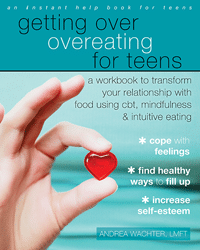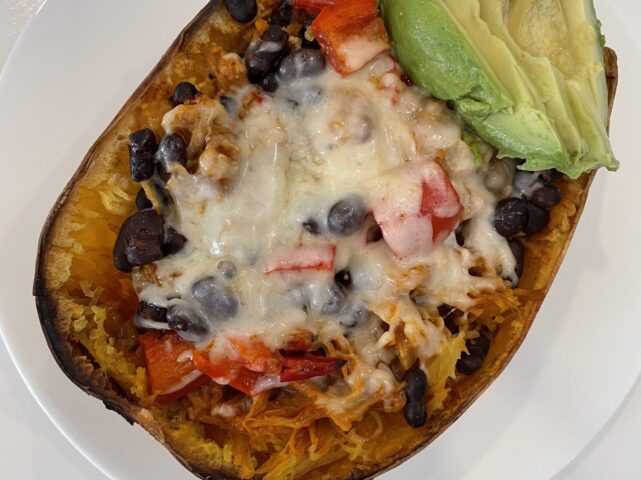By Andrea Wachter, LMFT
Helping Teens Get Over Overeating
Teenage Struggles With Eating
Being a teen is not easy—having to navigate friendships, family, love interests, school, homework, hormones, and future goals. And as if all that wasn’t enough, today’s teens have to contend with constant images and messages on social media, telling them how they should look, eat, exercise, and feel. Many teens simply aren’t equipped to handle the traditional pressures of adolescence, as well as the additional pressures of being a “screenager.”[1]
As a society, we’re all given endless rules about food, fitness, and feelings. It’s hard enough for adults to navigate all of this in our perfectionistic, plugged-in, fast-paced, image-obsessed culture. For teens, it can be really easy to slip into body hatred, depression, anxiety, addiction, food restriction or overeating—and sometimes all of these.
With diet ads, fad fear foods, and air-brushed images enticing them on one end of the spectrum and supersized portions, big gulps, and carb-laden drive-thru meals on the other, our culture sets up so many teens to ride the diet/riot roller coaster. Then they have the constant “shoulds” and rules about exercise, which break down their natural rhythms of movement and rest. Here, one end of the spectrum beckons them with cardio calculations and images of six-pack abs, while the magnetic pull of their screens and a good dose of hopelessness beckon them toward the couch. Constant images of perfectionistic bodies have most teens anxiously striving to look a certain way, leaving a wake of millions feeling depressed and ashamed about looking the way they do.
My Experience With Teenage Overeating
I started hating my body and yo-yo dieting as a teen, and because the only solutions I sought were the latest fad diet or Feel the Burn workout, my struggles escalated from there. It would be many years before I would finally unlearn the cultural craziness and relearn the natural wisdom we are all born with. I then decided to devote myself to helping others—the ol’ lemonade out of lemons deal.
Having spent the last twenty-five years counseling people who struggle with eating and body image, I’ve recently become dedicated to early prevention. The sooner someone gets help with disordered eating and body hatred, the higher the rate of success in overcoming them. While there is certainly hope for improvement at any age, an early start can save someone years of futile dieting and painful overeating. My latest book, Getting Over Overeating for Teens, is geared toward just that: helping adolescents who are struggling with overeating, binge eating, ineffective dieting, and body-image issues. Parents and health professionals can also utilize the tools and activities to help the adolescents they are concerned about.
In this book, I teach readers about four important areas that need to be addressed in order to get over overeating: emotional, mental, physical, and spiritual. Of course, I use much more teen-friendly language but knowing that all four areas need to be addressed in order to create what I call a “Stable Table” will help teens, parents, and mental-health professionals heal the pervasive problem of overeating in our diet-crazed, supersized culture.
Understanding What Causes Binge Eating In Teens
In section one, “Healing What You’re Feeling,” I help teens learn how to identify their emotions and exactly what to do with them other than turning to excess food. I write that “one of the biggest reasons people overeat is to try to stuff down their painful feelings. Overeating is like saying ‘go away’ to your feelings, especially painful ones. The only problem is that when we overeat to try to make our pain go away, it ends up causing more pain. This is because once we finish eating, we still have the original feelings we ate over, plus all the feelings we have from overeating. It’s a good try, though. Food does give us some comfort and distraction—for a little while anyway. Once you learn healthy ways to deal with your feelings, you’ll no longer need to use food like a drug, to try to make your feelings go away, and you can eat what you really like, in healthy amounts.”
So the emotional aspect of getting over overeating entails learning how to cope with difficult emotions rather than eat over them. Most of us have been taught that we are supposed to feel happy all the time, so feelings like sadness, anger, loneliness, and fear get a bad reputation. Ironically, this has contributed to an epidemic of depression and anxiety. So learning to identify, tolerate, and even welcome our uncomfortable emotions is a huge part of healing overeating. One metaphor I use is riding a wave. I write that “we can learn to ride a wave of emotion just like a wave in the ocean.” I teach teens that happy people are not always happy and that just like the weather has patterns, so do we. This will arm them, not only to get over overeating but to be much more equipped for healthy living in general.
Mindfulness And Teen Overeating
Section two, titled “Pay No Mind to Your Unkind Mind,” is all about our thinking. I write that “we all have automatic thoughts that pop up in our minds, just like we have automatic pop-up ads on our computer screens. It’s so easy to believe our thoughts. After all, they are our thoughts! They seem and feel so real, but the truth is, our thoughts aren’t always real, and they sure aren’t always helpful, kind, or true. The good news is that, just like we can close those unwanted pop-up ads on our computers with a simple click, we can learn to close the pop-ups in our minds.”
Readers will learn the concept of having different “mind moods.” We can have an “unkind mind, kind mind or quiet mind.” Oftentimes, people who turn to excess food have loud unkind minds and they use food in an attempt to soothe, quiet or even confirm their unkind thoughts. Teens will also learn about different ways to combat their unkind minds. “Strong, soft, silly or silent” is one chapter that gives them a menu of different tones they can take with their unkind thoughts.
Eating With Body Awareness
The third section of the book, “Befriending Your Body,” teaches readers how to take care of what I refer to as their “body battery.” Many adolescents who struggle with overeating are disconnected from their bodies’ natural signals. They, like many adults, turn to the only solutions our diet-crazed culture has up its sleeve—eat less and exercise more. But if this simple advice worked, most people would have a healthy, peaceful and natural relationship with food and movement (something we certainly cannot accuse our culture of having!).
In this section of the book, I teach readers how to “step off the diet/riot roller coaster”; how to “follow the clues of the foods that they choose”; how to identify their “hunger number”; how to “find their natural weight in a natural way,” and much more.
Teens can learn to “follow the clues of the foods that they choose.” This will help them see that the foods they overeat hold important clues as to what need they are trying to meet. For example, excess sugar may mean they need more sweetness in their lives (externally and internally). Turning to comfort foods might mean they need more comfort, and so on. They also might be choosing a certain food because it reminds them of when they were little and felt more taken care of and less pressure, or a certain food reminds them of someone they miss or resent. It’s so important to know that overeating is not about being weak but about important feelings and unmet needs. And as those get addressed, food will take its proper place.
A Wholistic Approach To Overeating In Teens
In the final section, “Filling Up Without Feeling Down,” I teach readers many ways to feed their spirits. I write that “it’s pretty easy in our fast-paced world to focus on feeding our bodies and feeding our minds. But if we want to get over overeating, we also have to feed the deeper parts of ourselves that can’t be seen, the parts of us that have nothing to do with the material world—our hearts and our souls. These are places that food won’t fill. If we overfeed our bodies, we might be full, but not truly fulfilled. If we feed only our minds, we might think and learn a lot, but we won’t be really satisfied. We all need to fill our spirits too, on a regular basis. When you truly feed your spirit, you feel better afterward. You feel truly filled up, and there are no negative or harmful consequences.” It’s essential for us all to find healthy, inspiring, satisfying ways to fill up. What fills you up?
If you love, work with or care about a teen (or tween) who is struggling with overeating, binge eating or body image, I hope you will consider this new read.
The above book excerpts from Getting Over Overeating for Teens have been reprinted with permission from New Harbinger Publications, Inc. copyright © 2016 Andrea Wachter
Andrea Wachter is a Licensed Marriage and Family Therapist and author of Getting Over Overeating for Teens. She is also co-author of Mirror, Mirror on the Wall: Breaking the “I Feel Fat” Spell and The Don’t Diet, Live-It Workbook. An inspirational counselor, author and speaker, Andrea uses professional expertise, humor and personal recovery to help others. For more information on her books, blogs and other services, please visit: www.andreawachter.com
[1] The term screenagers, coined in 1997 by media theorist Douglas Rushkoff, refers to techno-savvy young people, who have been reared on television and computers.








